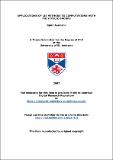Files in this item
Applications of Lie methods to computations with polycyclic groups
Item metadata
| dc.contributor.advisor | Linton, Stephen | |
| dc.contributor.author | Assmann, Björn | |
| dc.coverage.spatial | 93 | en |
| dc.date.accessioned | 2008-03-04T14:55:26Z | |
| dc.date.available | 2008-03-04T14:55:26Z | |
| dc.date.issued | 2007-11-30 | |
| dc.identifier | uk.bl.ethos.552054 | |
| dc.identifier.uri | https://hdl.handle.net/10023/435 | |
| dc.description.abstract | In this thesis we demonstrate the algorithmic usefulness of the so-called Mal'cev correspondence for computations with infinite polycyclic groups. This correspondence between Q-powered nilpotent groups and rational nilpotent Lie algebras was discovered by Anatoly Mal'cev in 1951. We show how the Mal'cev correspondence can be realized on a computer. We explore two possibilities for this purpose and compare them: the first one uses matrix embeddings and the second the Baker-Campbell-Hausdorff formula. Then, we describe a new collection algorithm for polycyclically presented groups, which we call Mal'cev collection. Algorithms for collection lie at the heart of most methods dealing with polycyclically presented groups. The current state of the art is "collection from the left" as recently studied by Gebhardt, Leedham-Green/Soicher and Vaughan-Lee. Mal'cev collection is in some cases dramatically faster than collection from the left, while using less memory. Further, we explore how the Mal'cev correspondence can be used to describe symbolically the collection process in polycyclically presented groups. In particular, we describe an algorithm that computes the collection functions for splittable polycyclic groups. This algorithm is based on work by du Sautoy. We apply it to the computation of pro-p-completions of polycyclic groups. Finally we describe a practical algorithm for testing polycyclicity of finitely generated rational matrix groups. Previously, not only did no such method exist but it was not clear whether this question was decidable at all. Most of the methods described in this thesis are implemented in the computer algebra system GAP and publicly available as part of the GAP packages Guarana and Polenta. Reports on the implementation including runtimes for some examples are given at the appropriate places. | en |
| dc.format.extent | 669752 bytes | |
| dc.format.mimetype | application/pdf | |
| dc.language.iso | en | en |
| dc.publisher | University of St Andrews | |
| dc.subject | Collection | en |
| dc.subject | Polycyclic groups | en |
| dc.subject | Mal'cev correspondence | en |
| dc.subject | Polycyclically presented groups | en |
| dc.title | Applications of Lie methods to computations with polycyclic groups | en |
| dc.type | Thesis | en |
| dc.contributor.sponsor | Daimler Benz Stiftung | en |
| dc.contributor.sponsor | Engineering and Physical Sciences Research Council (EPSRC) | en |
| dc.type.qualificationlevel | Doctoral | en |
| dc.type.qualificationname | PhD Doctor of Philosophy | en |
| dc.publisher.institution | The University of St Andrews | en |
This item appears in the following Collection(s)
Items in the St Andrews Research Repository are protected by copyright, with all rights reserved, unless otherwise indicated.

